Unit 2 English around the world泛读学案
- 格式:doc
- 大小:82.00 KB
- 文档页数:12
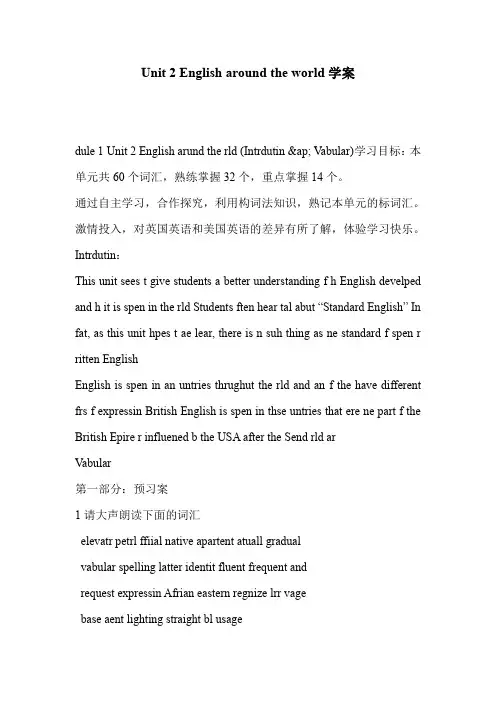
Unit 2 English around the world学案dule 1 Unit 2 English arund the rld (Intrdutin ≈ Vabular)学习目标:本单元共60个词汇,熟练掌握32个,重点掌握14个。
通过自主学习,合作探究,利用构词法知识,熟记本单元的标词汇。
激情投入,对英国英语和美国英语的差异有所了解,体验学习快乐。
Intrdutin:This unit sees t give students a better understanding f h English develped and h it is spen in the rld Students ften hear tal abut “Standard English” In fat, as this unit hpes t ae lear, there is n suh thing as ne standard f spen r ritten EnglishEnglish is spen in an untries thrughut the rld and an f the have different frs f expressin British English is spen in thse untries that ere ne part f the British Epire r influened b the USA after the Send rld arVabular第一部分:预习案1请大声朗读下面的词汇elevatr petrl ffiial native apartent atuall gradualvabular spelling latter identit fluent frequent andrequest expressin Afrian eastern regnize lrr vagebase aent lighting straight bl usagebeause f e up at present ae use f suh as pla a part in请同学们用红笔标出自己在发音中存在困难的单词。
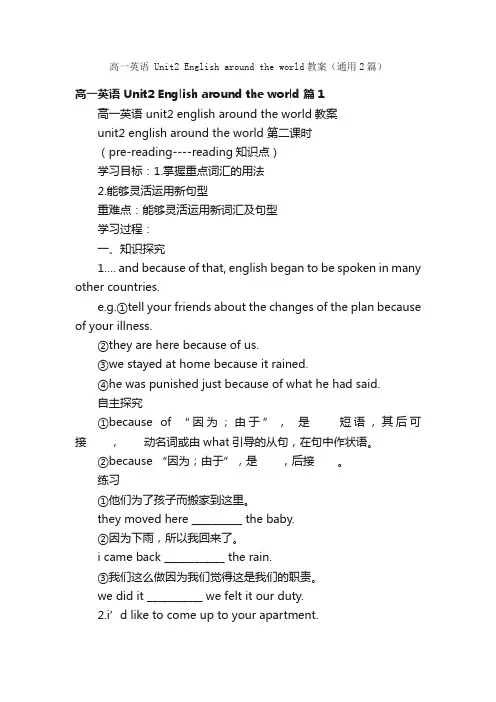
高一英语 Unit2 English around the world教案(通用2篇)高一英语 Unit2 English around the world 篇1高一英语 unit2 english around the world教案unit2 english around the world 第二课时(pre-reading----reading知识点)学习目标:1.掌握重点词汇的用法2.能够灵活运用新句型重难点:能够灵活运用新词汇及句型学习过程:一、知识探究1…. and because of that, english began to be spoken in many other countries.e.g.①tell your friends about the changes of the plan because of your illness.②they are here because of us.③we staye d at home because it rained.④he was punished just because of what he had said.自主探究①because of “因为;由于”,是短语,其后可接,动名词或由what引导的从句,在句中作状语。
②because “因为;由于”,是,后接。
练习①他们为了孩子而搬家到这里。
they moved here __________ the baby.②因为下雨,所以我回来了。
i came back ____________ the rain.③我们这么做因为我们觉得这是我们的职责。
we did it ___________ we felt it our duty.2.i’d like to come up to your apartment.猜测下列句子中come up 的词义。
①the little by came up to the stranger and showed him how to get to the police station.②we won’t forget the day when we watched the sun come up on top of the tai mountain.③it is certain that the question will come up at the meeting.④the snowdrops are just beginning to come up. _⑤i am afraid something urgent has come up. ____短语归纳come 邂逅come 向…扑来,攻击 come 来自 come 出版;开花;结果是come 想出,发现,提出come 发生come 绕道而来 come 落下,塌下指点迷津come up /come up with①come up 意为“被提及”时,其主语是被提出的内容,不能用于被动语态。
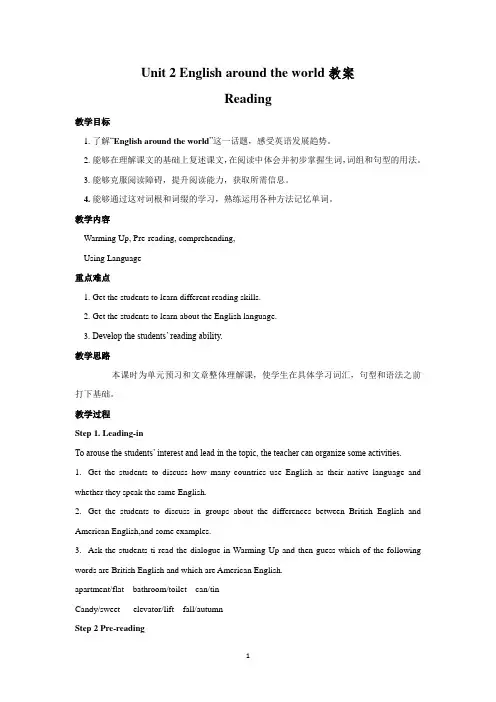
Unit 2 English around the world教案Reading教学目标1.了解“English around the world”这一话题,感受英语发展趋势。
2.能够在理解课文的基础上复述课文,在阅读中体会并初步掌握生词,词组和句型的用法。
3.能够克服阅读障碍,提升阅读能力,获取所需信息。
4.能够通过这对词根和词缀的学习,熟练运用各种方法记忆单词。
教学内容Warming Up, Pre-reading, comprehending,Using Language重点难点1.Get the students to learn different reading skills.2.Get the students to learn about the English language.3.Develop the students’ reading ability.教学思路本课时为单元预习和文章整体理解课,使学生在具体学习词汇,句型和语法之前打下基础。
教学过程Step 1. Leading-inTo arouse the students’ interest and lead in the topic, the teacher can organize some activities.1.Get the students to discuss how many countries use English as their native language and whether they speak the same English.2.Get the students to discuss in groups about the differences between British English and American English,and some examples.3.Ask the students ti read the dialogue in Warming Up and then guess which of the following words are British English and which are American English.apartment/flat bathroom/toilet can/tinCandy/sweet elevator/lift fall/autumnStep 2 Pre-readingGet the students first to discuss the two questions with their partners and then answer them.1.With your partner,list the countries that use English as an official language.2.Which country do you think has the most English learners?Suggested answers:1.Britain,USA,Australia,Canada,Singapore,Malaysia...2.China.Step 3.Fast reading1.Read the reading passage in 4 minutes and answer the question:What does the text mainly talk about?Suggested answer: A very brief history of the English language.2.According to the passage on page 13,what’s the main idea of it?Suggested answer:The passage is about standard English and dialects.Step 4.listeningThe teacher asks the students to finish the listening tasks on page 14 in order with the books open.After that, the teacher should ask the students to close their books and listen to the reading passage on page 10 with the following questions:1.How many people spoke English at the end of the 16th century?2.Which country may have the largest number of English learners?3.What dictionary does the passage talk about?Answers:1.About five to seven million people.2.China.3.The American Dictionary of the English language.Step prehendingRead the text of Reading carefully and do the following true or false questions.1.English has most speakers in the 17th century.2.English developed when new settlers and rules came to Britain.nguages frequently change.4.The Language of the government is alwaysthe language of the country.5.English is one of official languages used in India.6.This reading describes the development of the English language.Suggested answers:1.F2.T3.F4.F5.T6.TStep 6.Deep reading1.Which sentences in the text of Reading can replace the following sentence?People who speak English as their mother language can understand each other even though they speak different kinds of English.Suggested answer:Native English speakers can understand each ot her even if they don’t speak the same kind of English.2.Which word or phrase can replace “actually” in the text of Reading?Suggested answer: in fact3.Translate the following sentences into Chinese.(1)Today more and more people speak English as their first,second or a foreign language than ever before.(2)Believe it or not,there is no such thing as standard English.Suggested answer:(1)如今,说英语的人比以往任何时候都多了,他们有的是作为第一语言来说,有的是作为第二语言或外语。
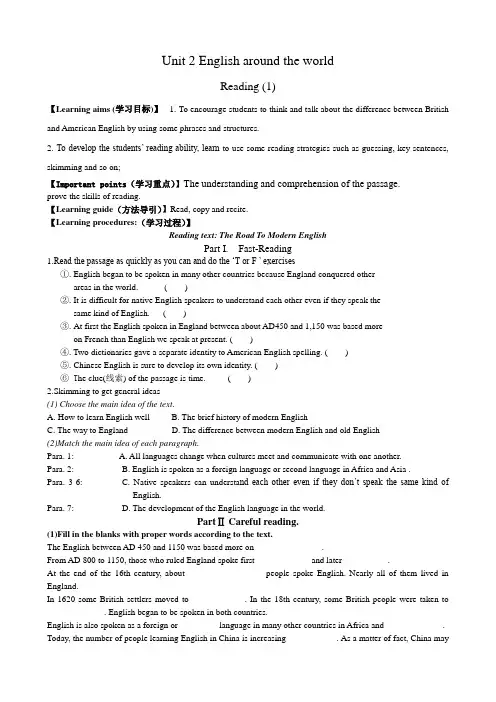
Unit 2 English around the worldReading (1)【Learning aims (学习目标)】 1. To encourage students to think and talk about the difference between British and American English by using some phrases and structures.2. To develop the students’ reading ability, learn to use some reading strategies such as guessing, key sentences, skimming and so on;【Important points(学习重点)】The understanding and comprehension of the passage.prove the skills of reading.【Learning guide(方法导引)】Read, copy and recite.【Learning procedures:(学习过程)】Reading text: The Road To Modern EnglishPart I. Fast-Reading1.Read the passage as quickly as you can and do the ‘T or F ’ exercises①. English began to be spoken in many other countries because England conquered otherareas in the world. ( )②. It is difficult for native English speakers to understand each other even if they speak thesame kind of English. ( )③. At first the English spoken in England between about AD450 and 1,150 was based moreon French than English we speak at present. ( )④. Two dictionaries gave a separate identity to American English spelling. ( )⑤. Chinese English is sure to develop its own identity. ( )⑥ T he clue(线索) of the passage is time. ( )2.Skimming to get general ideas(1) Choose the main idea of the text.A. How to learn English wellB. The brief history of modern EnglishC. The way to EnglandD. The difference between modern English and old English(2)Match the main idea of each paragraph.Para. 1: A. All languages change when cultures meet and communicate with one another.Para. 2: B. English is spoken as a foreign language or second language in Africa and Asia .Para. 3-6: C. Native speakers can understa nd each other even if they don’t speak the same kind of English.Para. 7: D. The development of the English language in the world.PartⅡ Careful reading.(1)Fill in the blanks with proper words according to the text.The English between AD 450 and 1150 was based more on _______________.From AD 800 to 1150, those who ruled England spoke first ____________ and later __________.At the end of the 16th century, about _________________ people spoke English. Nearly all of them lived in England.In 1620 some British settlers moved to ____________. In the 18th century, some British people were taken to _____________. English began to be spoken in both countries.English is also spoken as a foreign or ______ language in many other countries in Africa and _____________. Today, the number of people learning English in China is increasing ___________. As a matter of fact, China mayhave the ___________ number of English learners难句解析ter in the next century, people from England made voyages to conquer other parts of the world and because of that, English began to spoken in many other countries.in the next century 指17世纪that 指前面英国人所做的事本句意思:后来,在17世纪英国人开始航海征服了世界及其他地区。
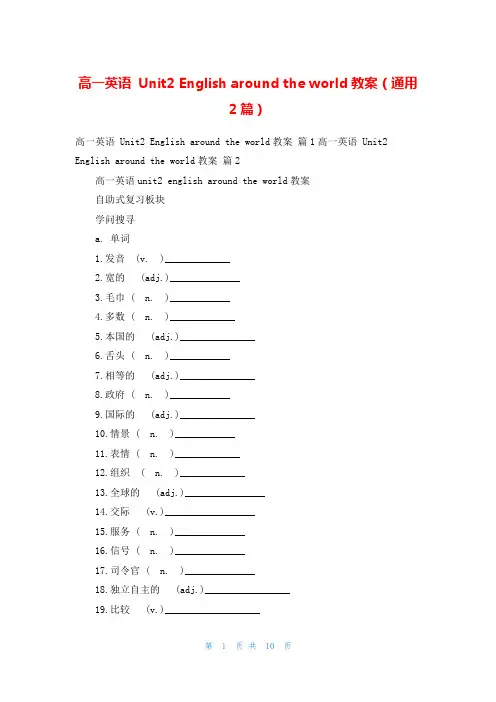
高一英语Unit2 English around the world教案(通用2篇)高一英语 Unit2 English around the world教案篇1高一英语 Unit2 English around the world教案篇2高一英语unit2 english around the world教案自助式复习板块学问搜寻a. 单词1.发音(v.)_____________2.宽的 (adj.)______________3.毛巾 (n.)____________4.多数 (n.)_____________5.本国的 (adj.)_______________6.舌头 (n.)____________7.相等的 (adj.)_______________8.政府 (n.)____________9.国际的 (adj.)_______________10.情景 (n.)____________11.表情 (n.)_____________12.组织 (n.)_____________13.全球的 (adj.)________________14.交际 (v.)__________________15.服务 (n.)______________16.信号 (n.)______________17.司令官 (n.)______________18.独立自主的 (adj.)_________________19.比较 (v.)___________________20.出版 (v.)___________________答案:1.pronounce 2.broad 3.towel 4.majority 5.native 6.tongue 7.equal ernment9.international 10.situation 11.expression anization 13.global municate15.service mander 18.independent pare20.publishb. 短语21.在这种情景下________ ________ ________22.与某人沟通_______ ________ ________23.引进,赢利________ _________24.发生_______ ________25.许多_______ ________ ________26.熬夜_______ ________27.大多数_________ _________ _________28.别客气_______ _________ _________ _________29.以……告终_______ ________ _______30.一个欧洲国家______ _______ ________31.母语,本族语______ ________32.全球变暖________ ________33.对……有非常好的了解________ ________ ________ _________________34.多多少少,或多或少________ ________ ________35.做……有困难________ ________ _________ _________36.说英语的国家________ ________37.总共________ _________38.国际组织________ __________39.交换服务________ ________40.在过去的几个世纪里________ ________ ________答案:21.in this situation municate with somebody23.bring ine about25.a great many 26.stay up 27.the majority of 28.make oneself at home 29 end up with 30 an european country31.mother tongue/native language 32.global warming 33.have a good knowledge of 34.more or less 35.have difficulty (in )doing36.english speaking countries 37.in total38.international organization 39.exchange services 40.over the centuriesc. 句型41.在那个男孩的关心下,我们没费多大的劲就找到了那个村庄。
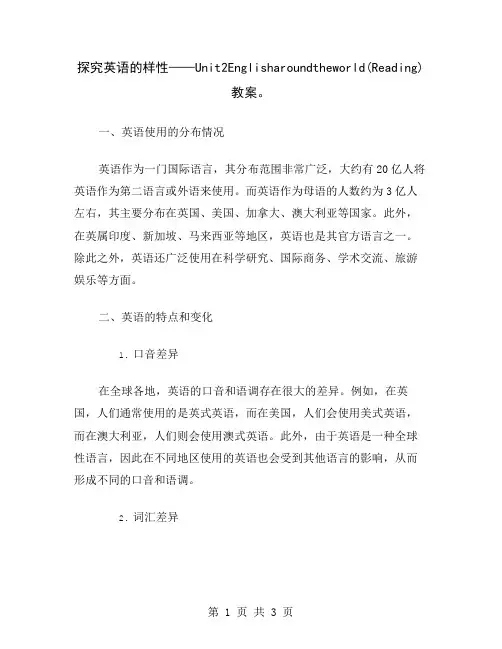
探究英语的样性——Unit2Englisharoundtheworld(Reading)教案。
一、英语使用的分布情况英语作为一门国际语言,其分布范围非常广泛,大约有20亿人将英语作为第二语言或外语来使用。
而英语作为母语的人数约为3亿人左右,其主要分布在英国、美国、加拿大、澳大利亚等国家。
此外,在英属印度、新加坡、马来西亚等地区,英语也是其官方语言之一。
除此之外,英语还广泛使用在科学研究、国际商务、学术交流、旅游娱乐等方面。
二、英语的特点和变化1.口音差异在全球各地,英语的口音和语调存在很大的差异。
例如,在英国,人们通常使用的是英式英语,而在美国,人们会使用美式英语,而在澳大利亚,人们则会使用澳式英语。
此外,由于英语是一种全球性语言,因此在不同地区使用的英语也会受到其他语言的影响,从而形成不同的口音和语调。
2.词汇差异由于英语在不同地区的使用场景和文化背景的不同,因此在词汇方面也会存在差异。
比如,在英式英语中,人们通常使用“lorry”来指代卡车,而在美式英语中,这个词则被称为“truck”。
3.语法差异英语在不同地区的语法也会存在差异。
例如,英式英语中的“have got”通常被缩写成“have”,而美式英语中则相反,通常将“have”缩写成“got”。
三、英语的影响1.语言层面英语作为一门全球性语言,其影响力不仅存在于使用方面,还体现在语言表达和传播上。
许多词汇和语言表达方式已经被广泛接受和使用,例如“OK”、“cool”、“by the way"等,已经成为全球人们日常使用的词汇。
2.文化层面英语作为源自于英国的语言,在其使用过程中也会带有一定的英国文化元素。
例如,英式下午茶、盎格鲁-撒克逊文化等。
3.社会层面英语作为全球通用语言,不仅在国际交流、商务合作中发挥着重要作用,同时也被人们视为是学术、文化、科技等领域的重要工具之一。
其在社会发展中的作用越来越凸显。
四、英语的未来英语作为一门全球通用语言,其影响力和地位已经无可替代,其未来发展前景也非常广阔。
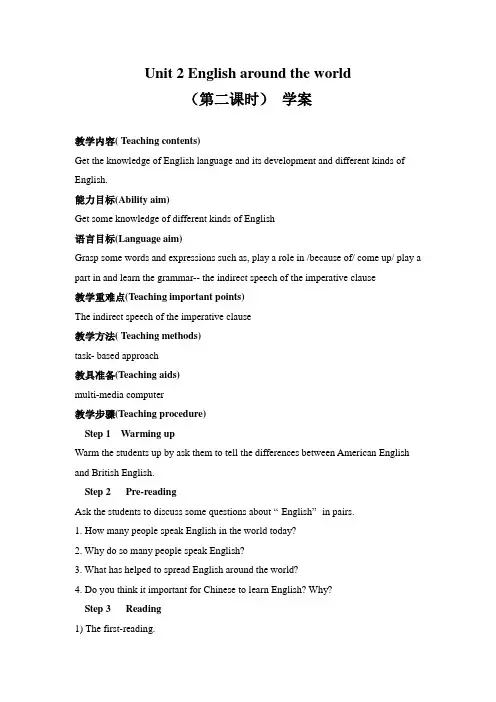
Unit 2 English around the world(第二课时)学案教学内容( Teaching contents)Get the knowledge of English language and its development and different kinds of English.能力目标(Ability aim)Get some knowledge of different kinds of English语言目标(Language aim)Grasp some words and expressions such as, play a role in /because of/ come up/ play a part in and learn the grammar-- the indirect speech of the imperative clause教学重难点(Teaching important points)The indirect speech of the imperative clause教学方法( Teaching methods)task- based approach教具准备(Teaching aids)multi-media computer教学步骤(Teaching procedure)Step 1 Warming upWarm the students up by ask them to tell the differences between American English and British English.Step 2 Pre-readingAsk the students to discuss some questions about “English” in pairs.1. How many people speak English in the world today?2. Why do so many people speak English?3. What has helped to spread English around the world?4. Do you think it important for Chinese to learn English? Why?Step 3 Reading1) The first-reading.Ask the students to scan the text and choose the correct answer in the book.2) The second-reading.Ask the students to read the text paragraph by paragraph, and get some detail information.a. For the first and second paragraph, students answer some questionsb. For the third and fourth paragraph, students find out the information to fill in the table of the development of English.c. For the last paragraph, students find out the reason why India speaks English. Step 4 Discussions1. Do you think it matters what kind of English you learn? Why?2. Why do you think people all over the world want to learn English?3. Do you think Chinese will become the most popular language in the world instead of English in the future?Step 5 ExtensionGive the students some information of origin of British English and American English.The formation of British EnglishFrom 17th century—19th centuryThe UK colonized Ireland and joined with Scotland long agoColonized ; North America, the Caribbean India, including Pakistan, Bangladesh, Australia, New Zealand, Palestine, parts of sub-Sahara Africa, Hong Kong, Singapore and the Pacific IslandsThe formation of American EnglishAmerican colonial rulers also brought their English to:Hawaii, Puerto Rico, the Philippines and other Pacific island in the late 19th century Introduce the situation of English speaking in China.Tell them some proper items.Native speaker: A person who speaks English since birth but who may not speak a standard form of it.L1 speaker: A native speaker of English who uses it as his or her mother tongue or animmigrant to an English-speaking country who always prefer to use itESL: English as a Second LanguageL2 speaker: A second language speaker of EnglishEFL: English as a Foreign LanguageStep 6 Homework1. Finish the exercise on page 11.2. Read passage on page 51 The Oxford English Dictionary and make notes about Murray’s life.。
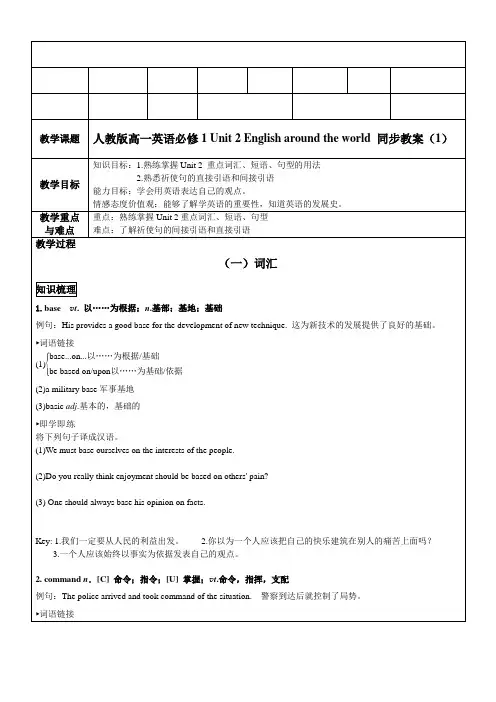
教学课题人教版高一英语必修1 Unit 2 English around the world 同步教案(1)教学目标 知识目标:1.熟练掌握Unit 2 重点词汇、短语、句型的用法 2.熟悉祈使句的直接引语和间接引语 能力目标:学会用英语表达自己的观点。
情感态度价值观:能够了解学英语的重要性,知道英语的发展史。
教学重点与难点 重点:熟练掌握Unit 2重点词汇、短语、句型 难点:了解祈使句的间接引语和直接引语教学过程(一)词汇知识梳理1.base v t . 以……为根据;n .基部;基地;基础例句:His provides a good base for the development of new technique. 这为新技术的发展提供了良好的基础。
►词语链接(1)⎩⎪⎨⎪⎧base...on...以……为根据/基础be based on/upon 以……为基础/依据 (2)a military base 军事基地 (3)basic adj .基本的,基础的►即学即练将下列句子译成汉语。
(1)We must base ourselves on the interests of the people. ___________________________________________(2)Do you really think enjoyment should be based on others' pain? _______________________________________________ (3) One should always base his opinion on facts.______________________________________________Key: 1.我们一定要从人民的利益出发。
2.你以为一个人应该把自己的快乐建筑在别人的痛苦上面吗? 3.一个人应该始终以事实为依据发表自己的观点。
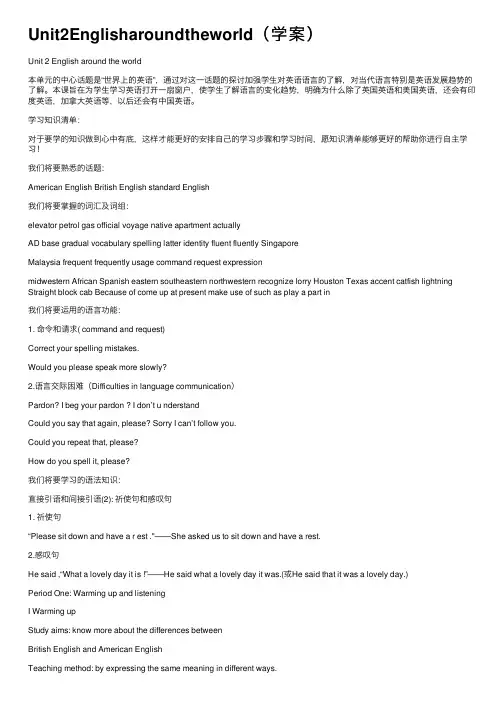
Unit2Englisharoundtheworld(学案)Unit 2 English around the world本单元的中⼼话题是“世界上的英语”,通过对这⼀话题的探讨加强学⽣对英语语⾔的了解,对当代语⾔特别是英语发展趋势的了解。
本课旨在为学⽣学习英语打开⼀扇窗户,使学⽣了解语⾔的变化趋势,明确为什么除了英国英语和美国英语,还会有印度英语,加拿⼤英语等,以后还会有中国英语。
学习知识清单:对于要学的知识做到⼼中有底,这样才能更好的安排⾃⼰的学习步骤和学习时间,愿知识清单能够更好的帮助你进⾏⾃主学习!我们将要熟悉的话题:American English British English standard English我们将要掌握的词汇及词组:elevator petrol gas official voyage native apartment actuallyAD base gradual vocabulary spelling latter identity fluent fluently SingaporeMalaysia frequent frequently usage command request expressionmidwestern African Spanish eastern southeastern northwestern recognize lorry Houston Texas accent catfish lightning Straight block cab Because of come up at present make use of such as play a part in我们将要运⽤的语⾔功能:1. 命令和请求( command and request)Correct your spelling mistakes.Would you please speak more slowly?2.语⾔交际困难(Difficulties in language communication)Pardon? I beg your pardon ? I don’t u nderstandCould you say that again, please? Sorry I can’t follow you.Could you repeat that, please?How do you spell it, please?我们将要学习的语法知识:直接引语和间接引语(2): 祈使句和感叹句1. 祈使句“Please sit down and have a r est ."——She asked us to sit down and have a rest.2.感叹句He said ,“What a lovely day it is !”——He said what a lovely day it was.(或He said that it was a lovely day.)Period One: Warming up and listeningI Warming upStudy aims: know more about the differences betweenBritish English and American EnglishTeaching method: by expressing the same meaning in different ways.study step 1. At first, answer some questions about English.Questions: A. how much do you know about the English language?1. _____________________________________.2.___________________________________________.3.___________________________________________.4._____________________________________________.Question B. in what situations is English used?Question C. What is native language?It is the language that_____________________________________________________________Question D. What is English as a second language ?It is the language used by ______________________, but people speak the language of their country at home. Question E. Do you know the difference between B.E and A.E?study step 2. 做第9页的热⾝部分,来体会同⼀事物在英国英语和美国英语的不同表达。
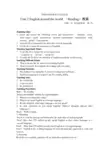
邛崃市教师教学大比武活动Unit 2 English around the world (Reading)教案邛崃一中英语教研组胡华Teaching Aims:1.Learn and master the following words and expressions: majority nativetotal tongue equal government situation international organization trade tourism global communicate2.Train the Ss to summarize the main idea of each paragraph.3.Get the Ss to know the importance of English.Teaching Important Point:1.To get the Ss to master the useful expressions:a majority of in total except for2.To make the Ss know the situation of English around the world clearly. Teaching Difficult Points:1. How to arouse the S s’ interest in learning English .2 How to help the Ss complete the reading tasks smoothly.Teaching Methods:1.The method of arousing the Ss interest in what they will learn.2.Task-based approach to improve the Ss’ reading ability.Teaching Aids:1.the multimedia2. a tape recorder3.the blackboardTeaching Procedure:Step1 Pre-readingArouse the students’ interest by a questionnaire:1.What are we doing here today?2.Why do we learn English as a foreign language?3.Besides English, what other languages can you speak?4.In what situations do you speak English/ Chinese/ Qionglai dialect/ otherlanguages?Step2 While-reading1. SkimmingAsk Ss to read the passage and summarize the main idea of each paragraph.Para1 More than 750 million people speak English as their native language or a second language.Para2 More than 750 million people learn English as a foreign language.Para3 English is the working language of most international organization, trade and tourism.2. ScanningRead the text carefully, and then tell me what these numbers refer to.42 countries 375 million 750 million 50 years3. Multiple-choice1. People from the following countries except ____ use English as their mother language.A. New ZealandB. South AfricaC. the PhilippinesD. Ireland2. Which is true about those who use English as a second language?A.English is also their mother tongue.B.English is usually the official language in their countries.C.They learn English for five or six years at high school.D.They talk with family members at home in English.3. What’s the situation of English used in China?A. All Chinese students speak English as a foreign language.B. Most Chinese students learn English at school as a foreign language.C. The majority of Chinese speak English at school as a foreign language.D. The majority of people in Hong Kong use English as their mother tongue.4. Which of the following statements cannot be inferred from the last paragraph?A. In the past 50 years, the English language has developed very fast.B. English is widely used in different fields around the world.C. Those who can’t speak good English will never be successful in international trade.D. More and more people around the world will be able to communicate in English.Step 3. Post -reading1. Complete the summary on P11.2. Listen to the text and repeat after the tape.3. RetellingAsk the students to retell the text in their own words with their books closed.The teacher will show some key words on the screen to help them.Then invite some students to retell the three paragraphs in turn.Step 5 HomeworkTry to retell the text in your own words and write down the passage.。
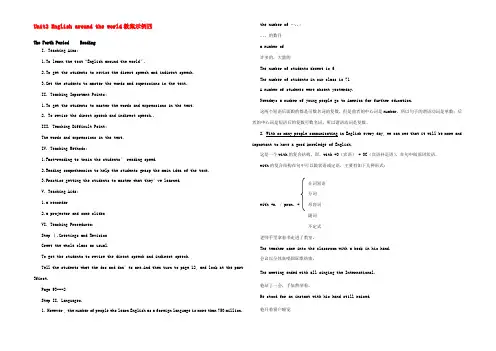
Unit2 English around the world教案示例四The Forth Period ReadingI. Teaching Aims:1.To learn the text“English around the world”.2.To get the students to revise the direct speech and indirect speech.3.Get the students to master the words and expressions in the text.II. Teaching Important Points:1.To get the students to master the words and expressions in the text.2. To revise the direct speech and indirect speech..III. Teaching Difficult Point:The words and expressions in the text.IV. Teaching Methods:1.Fast-reading to train the students’ reading speed.2.Reading comprehension to help the students grasp the main idea of the text.3.Practise getting the students to master what they’ve learned.V. Teaching Aids:1.a recorder2.a projector and some slidesVI. Teaching Procedures:Step Ⅰ.Greetings and RevisionGreet the whole class as usual.To get the students to revise the direct speech and indirect speech.Tell the students what the dos and don’ts are.And then turn to page 12, and look at the part 3first.Page 93---2Step II. Languages.1. However , the number of people who learn English as a foreign language is more than 750 million.the number of …..:。
Unit 2 English around the world Reading学案1我们将要熟悉的话题:American English British English standard English我们将要掌握的词汇及词组:elevator petrol gas official voyage native apartment actuallyAD base gradual vocabulary spelling latter identity fluent fluently Singapore Malaysia frequent frequently usage command request expression midwestern African Spanish eastern southeastern northwestern recognize lorry Houston Texas accent catfish lightning Straight block cab Because of come up at present make use of such as play a part in我们将要运用的语言功能:1. 命令和请求( command and request)Correct your spelling mistakes.Would you please speak more slowly?2.语言交际困难(Difficulties in language communication)Pardon? I beg your pardon ? I don’t u nderstandCould you say that again, please? Sorry I can’t follow you.Could you repeat that, please?How do you spell it, please?3. 感谢(thanks)Thanks so much我们将要学习的语法知识:直接引语和间接引语(2): 祈使句和感叹句1. 祈使句“Please sit down and have a rest ."——She asked us to sit down and have a rest.2.感叹句He said ,“What a lovely day it is !”——He said what a lovely day it was.(或He said that it was a lovely day.)I. 重点单词(能花十分钟把I和II两部分的单词和词组在课本中查出来并写上吗?相信自己能够做到!查完了别忘了读一读记一记哦~~)1. (n)电梯;升降机(同义词)2. (n)(英)汽油(同义词)3.________(adj.)官方的;正式的;公务的;(n)办公室(n.)政府官员4. ________ (n) 航行;航海5. ________( adj.)本国的;本地的(n.)本地人;本国人_______6. _________ (n)(美)公寓; (同义词)_______7. _________ (adj.)逐渐的; ________ (adv.)8. __________(adj.)实际上;事实上__________(adv)9. __________(adj.)流利的;流畅的(adv)__________10.________( adj.)频繁的;常见的(adv)__________II. 重点短语1. more __________one kind 不止一种2. _____the world 全世界3. _______ some important ways 在一些重要方面4. a large number_______ 大量的,许多的5. _______ fact 事实上,实际上6. because _______ 因为;由于7. come_______ 走近;上来;提出8. ________ present 现在9. Make use________ 利用;目前10.such ________ 例如;像这种的III. 语篇导读1)阅读The Road to Modern English, 然后完成下面的表格。
Unit2 English aroud the worldWarmming up /Reading]Learning aims:1.words and expressionselevator petrol gas official voyage native latter apartment actually gradually/gradual vocabulary spellingidentity fluent/fluently an official language make voyage because of come up be based on at present make use of such as 2.Sentences1)Actually all languages change and develop when cultures meet and communicate with each other.2) Native English speakers can understand each other even if they don’t speak the same kind of English.3)Then gradually between about AD800 and 1150,English became less like German because those who ruled England spoke first Danish and later French.课前自主预习按要求完成句子1.An __________(官方的) announcement is expected in the next few days.2.One afternoon,I got bored and_________(实际上) was asleep for a few minutes.3.The short play is _______(base) on a true story in our village.4.He has formed a habit of______________(communicate) with his foreign friends in English.5.He_________(gradual) lost interest in learning playing cards.预习课文判断正误1.English had the most speakers in the 17th century. ( )2.English developed when new settlers and rulers came to British. ( )nguage frequently change ( )4.The language for the government is always the language of the country. ( )5.English is one of the official languages used in India. ( )6.This reading describes the development of the English language. ( )课堂合作探究1.native adj______ n._______1)The panda is native to China. 划线部分短语意为_______________________2)English is his native language. 翻译句子__________________________即使巩固1)Spanish is the _____language of most Spaniards.(西班牙人)A.local B.home C.native D.birth2) The tiger is ______ to India.A.livingB.fromC.bornD.nativee up 意为__________1)A foreigner came up to me and asked the way to the station.翻译______________________________________________2) The problem came up at the meeting.划线短语意为__________.其主语是被提出的内容,主动形式表示被动意义。
高中英语 Unit2 English around the world Reading学案新人教版必修2around the worldWarming up and Reading导学案【学习目标】1 使学生对英国英语和美国英语的差异有所了解。
2 通过阅读课文,掌握基本的阅读方法,并使学生了解英语在世界上的发展状况。
3 预习本单元的重点词汇和单词。
【预习案】1 朗读词汇p93 (subway---frequently)2 课前思考英式英语和美式英语在哪些方面的区别3 找出文中的重点单词和词组1、voyage________8、因为,由于______________2、 native________9、走近,上来,提出_______3、 actually_______10、以……为基础__________4、 gradually______11、目前,现在____________5、 latter_________12、使用,利用___________6、 fluently______13、例如,像这种的________7apartment___________14 、、、、的数目______________【课内探究】【活动探究2】Look at the title and guess what it is about、The road to modern English【活动探究3】Skimming Try to find out the key sentence for each part、Para1Para2Pare3-4Para5【活动探究4】Scanning Fill in the formTime Factsbetween AD450and1150English was1 English spoken today、between about AD800 and1150、English became less like2 In the1600sShakespeare made use of3 than before、In the18th century4 people brought English to、5 、From1765 to1947English became the language for6 in India、todayMore people speak English than ever before、 The number of people7 in China8 rapidly、【活动探究5】Careful Reading Do exercises on p101【活动探究6】小组合作探究Why do you think more people in the world now want to learn Chinese?【当堂检测】1 English has/had the most speakers_________、A、 nowB、 when the British ruled many parts of the worldC、 in the time of ShakespeareD、 in the12th century2、 Which of the following statements is true?A、 Language always stay the same、B、 Language change only after wars、C、 Language no longer change、D、 Language change when cultures change、3、 FromAD450 to1150, English sounded more like______、A、 FrenchB、 ChineseC、 GermanD、 Russian4、Shakespeare’s English was spoken around________、A、1400’sB、1500’sC、450’sD、1600’s5、 Which country has the fastest growing number of English speakers in the world?A、 AustraliaB、 ChinaC、 IndiaD、 Britain【课后练习】翻译句子1 Native English speakers can understand each other even if they don’t speak the same kind ofEnglish、2 It is based more on German than the English we speak at present、3 Today the number of people learning English in China is increasing rapidly、4 More people speak English as their first, second or a foreign language than ever before、。
Unit Two English around the WorldPeriod 1 Warming Up and Reading【目标展示】1.掌握并会熟练运用词汇2.学会分析课文中的长难句,概括文章的主旨,并能理解语篇中的重要细节【知识导学】Words and Expressions英译汉1. petrol station___________________2. The new subway is being laid. ___________________3. The Goths invaded Rome in A.D. 410. ___________________※4. I believe man will conquer the weather in the future. ___________________汉译英5. 按一下电梯的按纽。
___________________6. 剩下的汽油不多了。
___________________7. 这次海上航行的旅程似乎没有尽头。
___________________8. 你是土生土长的中国人吗?___________________※9. 他在住宅区租了一间公寓。
___________________派生词及不规则动词(根据括号内的汉语提示填写适当形式的单词并翻译句子)10. Is the news ___________(官方)?A courier delivered the parcels to our ___________(办公室).11.___________(实际上;事实上), that sort of thing isn't for me.I need the ___________(实际上;事实上)figures, not an estimate.短语(翻译下列短语与句子,每个短语与句子至少用上本单元一个词或短语)12. 因为有雾所有航班都已被推迟. _______________________________________之所以认识,是因为我们见过他. _______________________________________ 13. 到火炉边来,你就会觉得暖和。
Unit 2 English around the world Reading学案【学习目标】1.快速阅读并迅速找到各段的中心句。
2.通过阅读文章能够从篇章结构的角度出发,通过时间线索描述英语语言发展的历史过程。
3. 能够在阅读的过程中对主要的阅读信息进行记录,并能根据这些信息对原文进行复述。
【重点难点】重点:学会从篇章结构(时间线索)的角度去分析一篇文章。
难点:根据提示信息,学会自己复述文章。
【导学流程】Step1 Warming upHave a quiz. Look at the flags and answer the questions: Which countries do these flags belong to? What language do they speak?Step2 Fast ReadingTask 1. Read the text quickly and choose the main idea.A. How to learn English wellB. The brief history of Modern EnglishC. The way to EnglandD. The difference between Modern English and Old EnglishTask 2. Match the main idea with each paragraph.Para 1 Why has English changed over time?Para 2 Finally by the 19th century the language was settled.Para 3 More people speak English all over the world.Para 4 English is now spoken as a foreign or second language in South Asia.Para 5 Native English speakers can understand each other even if they don’t speakthe same kind of English.Step 3 Careful ReadingTask 3 Read the passage again and fill in the blanks..Task 4. Read the passage carefully and decide whether the statements are true (T) or false (F) and explain why.1. English had the most speakers in the 17th century. ( )2. English developed when new settlers and rulers came to Britain. ( )3. Languages frequently change. ( )4. The language of the government is always the language of the country. ( )5. English is one of the official languages used in India. ( )6. This reading describes the development of the English language. ( )堂测堂练课文语法填空At first, only people in ________ (English) spoke English. Later, people from England ______ (move) to other parts, so English began to be ________(speak) in many other countries. Today, many people speak English as their _____(one), second or foreign language. Native English speakers can understand each other but not everything. All languages change when ________(culture) communicate with one another. So there are _______ (Britain) English, American English, Australian English and so on. They all have their own _______(identify). English is also spoken as a foreign or second language in many other countries. Maybe one day _______ (China) English will become one of the world English.。
Unit 2 English around the world泛读学案Reading OneStep I. GuessingGuess according to the title: The road to modern English. What do you think the word “road”mean in the title?A. wayB. developmentC. differencesStep II. Fast readingSkim the text on page 9 and choose the best answer according to the text.1. English has/had the most speakers___.A. nowB. when the British ruled many parts of the worldC. in the time of ShakespeareD. in the 12th century2. What will happen to the native English speakers if they speak different kinds of English?A. They can understand each other.B. They can‟t understand each other at all.C. They may not be able to understand everything.D. They need an explanation.3. Which of the following statement is true?A. Languages always stay the sameB. Languages change only after warsC. Languages no longer changeD. Languages change when cultures change4. From Paragraph 3 we know that the English language was once influenced by ________ .A. the Chinese languageB. people from South AsiaC. people from South AfricaD. both German and French5. Who gave a separate identity to America English spelling?A. ShakespeareB. Samuel JohnsonC. Noah WebsterD. British settlers6. From the last paragraph we can see that the author __________ .A. is quite sure that Chinese English will become one of the world Englishes.B. has no idea whether or not Chinese English will become one of the world Englishes.C. thinks that government and education play an important role in English learningD. feels very satisfied to see more and more Chinese people are learning EnglishStep III. Careful reading1) What‟s the main idea of the text?The text mainly tells us the ______________________________ of the ___________ language.3) Read the text and decide whether the statements are true or false.1. English had the most speakers in the 17th century. ( )2. English developed when new settlers and rulers came to British. ( )3. Languages frequently change. ( )4. The language of the government is always the language of the country. ( )5. English is one of the official languages used in India. ( )6. This reading describes the development of the English language. ( )7. At the end of the 16th century, nearly all the English speakers lived in England ( )8. It is because the cultures meet and communicate with each other that the English language changes and develops ( )9. Now, India has the largest number of English learners. ( )Step IV. Translate the following sentences into Chinese.1. Native English speakers can understand each other even if they don‟t speak the same kind of English.2. So why has English changed over time?3. Shakespeare made use of a wider vocabulary than ever before.4. Only time will tell.Reading TwoStep I. Find the topic sentence of each paragraph, and translate it into Chinese.Paragraph 1.___________________________________________________________________Paragraph2.____________________________________________________________________ Paragraph3.____________________________________________________________________ Step II. Read the text on page 13 and then choose the best answer.1. From the text, we know that ______ is standard English.A. British EnglishB. American EnglishC. The English spoken in Australia D no English2. People think the English spoken on TV and the radio is standard English, because _______ .A. people believe those who reported the news speak excellent EnglishB. they speak the same EnglishC. they speak it to all peopleD. there are some dialects on TV and the radio3. How many dialects are mentioned in the text?A. ThreeB. TwoC. FourD. Five4. Which of the following is not the reason for the dialects in American?A. People have come from all over the world.B. Some people live in the mountains.C. Geography plays a part in making dialects.D. The USA is a large country.Step III. Translate the following sentences into Chinese.1. Believe it or not, there is no such thing as standard English.2. However , on TV and the radio you will hear differences in the way people speak .3. The USA is a large country in which many different dialects are spoken.Unit 2 English around the world知识点学案1.more than one 不止一个 more than one +名词单数, 后面的谓语动词用单数。
More than one student _______(want)to go to swim. 不止一个学生想去游泳。
more than的相关用法:more than+数词,意为比……多,多于,超过;more than+名词,意为不只是,不仅仅;more than+形容词或副词,意为十分,非常;1) I have known David for more than 20 years. ()2) Jason is more than a lecturer; he is a writer, too. ()3) I assure you that I am more than glad to help you. ()2. native adj. 本土的,本国的,土生的(+to)The giant panda is native to China. 大熊猫是中国特有的动物。